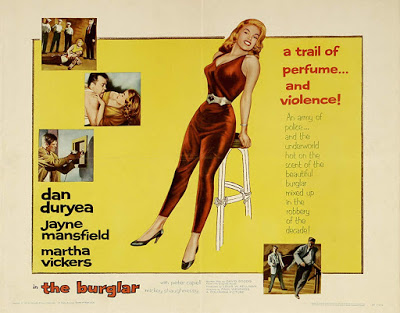Director: Paul Wendkos
Year: 1957
Rating: 7.5
This edgy off-beat off-kilter crime caper has had
a growing reputation over recent years ever since its release was postponed
for two years because Columbia Pictures didn't really know what to do with
it. Then one of its stars Jayne Mansfield became a thing, a sensation and
the film was put into theaters but never went far. The film today has a modernistic
feel to it - fatalistic, tragic with a psychological undercurrent running
through it that is rough and tormented. All this is accentuated by the black
and white photography with its claustrophobic settings, stark close-ups,
inventive camera angles and jangly bursts of music. When they finally leave
the closed in volatile setting for the open road and Atlantic City, you can
feel doom following in their footsteps.
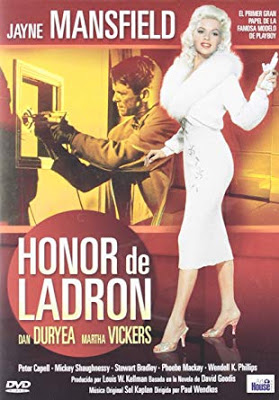
The script was written by David Goodis based on his novel of the same name.
Goodis like this film has seen his reputation revived over the years. In
the 1940s and 50s he was one of the better known hard-boiled pulp writers
but by the early 1960s all of his books were out of print. Even his best
received novel Dark Passage, that was made into a film with Bogart and Bacall.
He was by all accounts quite an eccentric and never fit in Hollywood when
he worked for Warners - he had had a messy marriage that seems to have screwed
with his head and led him to often portray women as manipulative bitches
which of course is perfect for his genre.
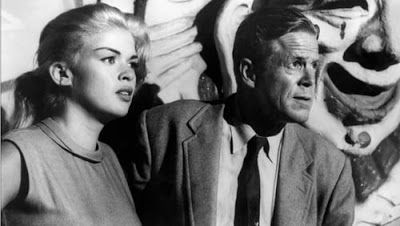
He used to buy the cheapest suits he could find though he was making a good
salary and dye them all blue, live in fleabag hotels and turn down requests
from actresses like Bacall and Ann Southern to be their escort in order to
go out to clubs in the worst part of town and find large women he could pay
to abuse him verbally. He had been in love with a married woman who left
her husband but only to marry Paul Wendkos, who in fact is the director of
this film in his debut. Goodis died in 1967 and years later the French took
a liking to him and used his novels for the basis of a number of films. Back
in 1960 François Truffaut had directed Shoot the Piano Player from
one of Goodis's books. His books are available again and quite good.
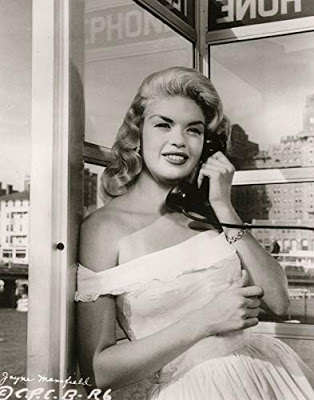
It is a crime caper. An expensive necklace is stolen from an old lady's mansion
after it was cased by a sweet young thing who came to her door and was shown
around. The organization consists of four people - the head Nat (Dan Duryea),
two henchmen and a dame - Gladden - as in boy am I gladden to see you, Jayne
Mansfield looking like a honey dipped ice cream cone. The theft is simple
enough and done by 20 minutes into the film - then it gets all Sartre like.
Nat decides it is too hot to sell the necklace and that they need to stay
in Philly and wait - and wait - and wait - and the crew begins to claw at
one another like cats in a box - needing space. And one of the thugs (Mickey
Shaughnessy) can't keep his leering eyes off of Gladden and who can blame
him - stuck in a house with no TV, radio, phone or social media - how many
of us would not be watching Mansfield walk. And sit. The other thug (Peter
Capell) goes stir crazy dreaming of getting on an airplane for Central America
once they get their payoff.
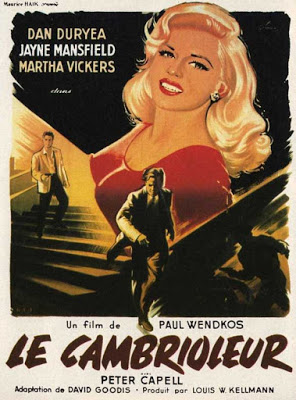
Nat is cool on the surface with demons coursing through his body from a promise
he made to his foster father to take care of the man's daughter Gladden years
ago and that he holds on to obsessively like a religious thorn of trees.
Gladden clearly has the hots for him but that feeling is returned like a
cold sandwich. Two other characters enter the story - they know of the robbery
and are looking to cash in themselves. One is played by Martha Vickers, who
was Carmen, the psychotic sister in The Big Sleep. She had been 21 when she
made The Big Sleep and as soft as a cozy feather pillow and as desirable
as your next breath. Ten years later the baby fat is gone and she is sleek
and brittle which reflected her real life - three bad marriages - one of
course to Mickey Rooney who seems to have married every starlet in Hollywood
- and a fading career.
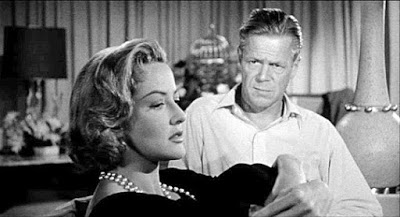
It all plays out on the boardwalk of Atlantic City with a Lady from Shanghai
influenced scene in the Fun House. Duryea is of course good as he always
is but he plays his character as basically a tortured but decent man as opposed
to how manic he can often get in films but it is Mansfield that surprises
here with her vulnerable performance as a woman who can't find love with
the right guy.
